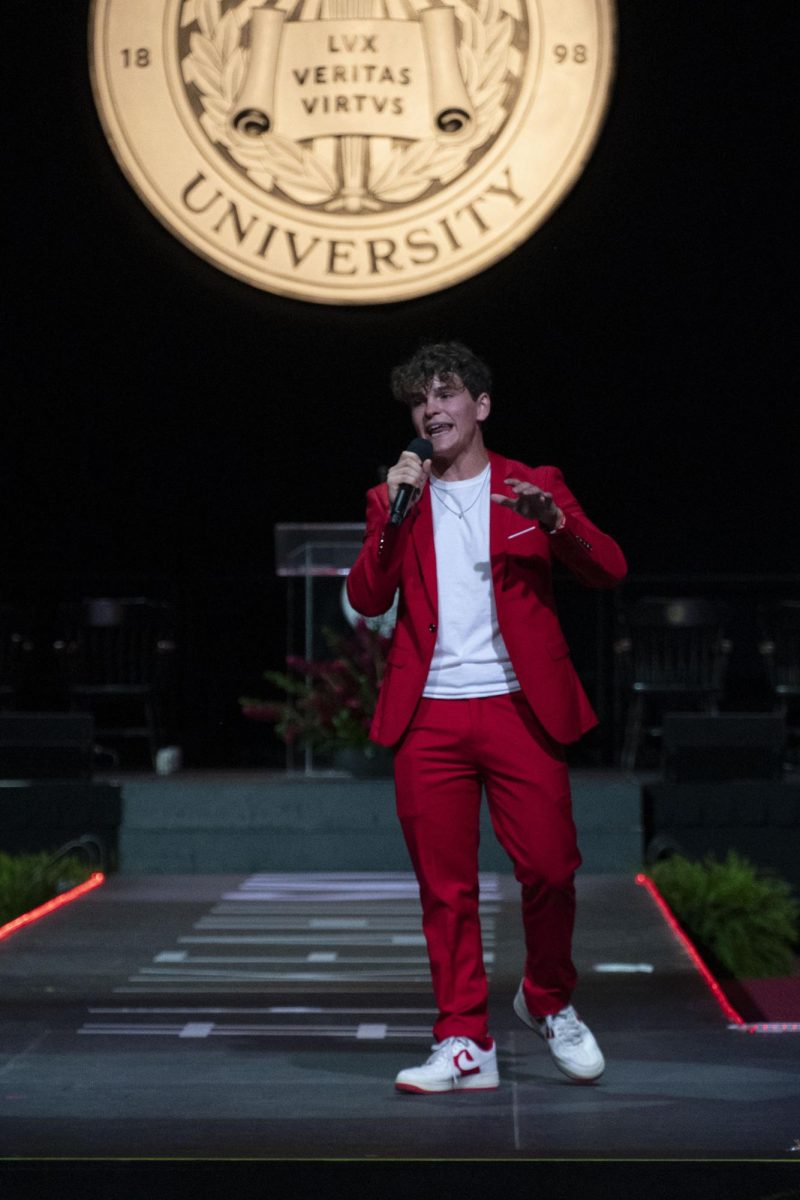 By Aly Britt, News Correspondent
By Aly Britt, News Correspondent
Sweatshirts, tote bags and T-shirts donning large Greek letters are becoming more visible on campus as fraternities and sororities continue their blossoming presence on campus through pledge weeks.
In the past two years, two sororities and one fraternity opened chapters on campus, and another fraternity will be added in the spring.
“Fraternity and Sorority Life (FSL) plays a major role in campus life, from leadership development to community service to campus-wide programming and a whole lot in between,” Vice President for Student Affairs Ed Klotzbier said in an e-mail to The News. “The number of students participating in FSL has more than doubled in the past five years and we are continuing to add more FSL organizations to our campus community.”
To accommodate this increase, Northeastern hired another staff member to help with FSL, Dexter Bush-Scott, who joined the staff in June as coordinator of FSL and Leadership and has aided the Panhellenic Council throughout recruitment season.
Recruitment for the Panhellenic Council was last week, with sororities making their final decisions on Monday night. Christina Bonke, vice president for recruitment of the Panhellenic Council, said that during recruitment, potential new members get introduced to members of different sororities, eventually narrowing their interest to one sorority on the last night of recruitment.
“If everything works out you get a bid,” Bonke said.
But not all students who begin the process get a bid: Bonke said the numbers usually drop throughout the week because some people decide Greek life isn’t for them. Last year, around 287 women registered for recruitment, but only about 225 women completed the process, Bonke said. Out of these, 204 were actually placed in one of seven sororities.
“This is a testament to the growth of Northeastern,” said Amanda Sabia, executive vice president of the Panhellenic Council. “I went through recruitment freshman year [fall 2006], and my member class had 18 women in that, and prior to that there were 10 or so. So it’s basically gone from 18 people per pledge class to about 30.
Membership has also increased in fraternities as well, with the Interfraternity Council adding Beta Theta Pi last year. Interfraternity Council President Joel Wanger said that with the rate of growth, he expects the amount of students involved in Greek life to increase from eight percent to about 10 percent after this week’s recruitment, ending Oct. 9.
“I feel like the opinion of Greek life has changed over the years,” said Lucas Rose, Alpha Epsilon Pi member and Student Government Association senator. “I feel like people saw ‘Animal House’ once and thought that’s what we did.”
Several students were asked about their potential involvement in the recruitment process.
Trevor Polidore, a freshman engineering major, said he intends to rush for a fraternity because “it will enhance the college experience” and provide a close group of friends.
Certainly, fraternities and sororities have worked hard to promote this image, Bonke said. She said each sorority member is required to participate in community service every semester. Opportunities for service include the Martin Luther King Service Day, the NU Service Day and Relay for Life. Sororities and fraternities also raise funds to benefit service projects or charities, such as associations for breast cancer and certain children’s illnesses.
“Within each chapter, we each have our own philanthropies,” Sabia said. “We look at a minimum goal of 10 hours per semester, and almost everyone does well above that. The way the Greek life has been designed at Northeastern … it has been more of a foundation rather than your entire life. You’re still able to be active in other student life.”
There are some challenges to the expansion of Greek life at Northeastern, though. A unique element of Greek life in Boston is the lack of fraternity and sorority houses. Unlike some colleges and universities that have a Fraternity/Sorority Row, Northeastern has only one licensed fraternity house associated with the university: Beta Gamma Epsilon. Similarly, surrounding colleges and universities generally do not have Greek houses.
The lack of sorority houses has long been attributed to the “brothel” law – which allegedly states that no more than six young women can live in the same unit because that legally makes it a brothel – but no law actually exists. In reality, the uncommonness of sorority and fraternity houses in Boston can be directly attributed to zoning laws. A recent amendment to the City of Boston’s zoning code says “five or more students sharing an apartment, single family house or any other dwelling unit” violates the code.
However, members said connections and dedication to an organization benefit them, and fraternities and sororities ultimately benefit the school.
“I’ve had incredible experiences within my sorority,” Sabia said. “There’s a lot of things that the Greek community can provide to Northeastern that I really do think is a great supplement and a great compliment to the campus.”








